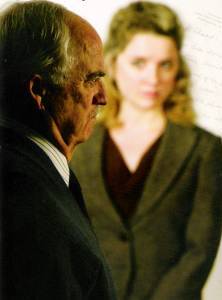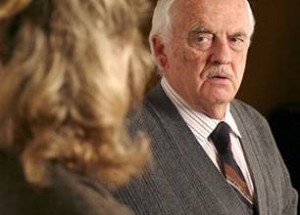
There are times when all it takes is two actors to fill a stage, to fill it with humor and drama and heart. Trying, Joanna McClelland Glass’s much-loved two-hander, provides a pair of actors with just such an opportunity to shine.
The play’s 2007 production at Burbank’s Colony Theatre gave the Colony its biggest hit in years, multiple award nominations—and both the Ovation and the Los Angles Drama Critics Circle awards for lead actor Alan Mandell’s work as former U.S. Attorney General Francis Biddle.
Lightning could easily strike once more, this time for Ventura’s Rubicon Theatre Company, where Trying has just opened, its leading roles brought to vivid life by the real life father-daughter team of Robin Gammell and Winslow Corbett. The Rubicon’s production, superbly directed by Jenny Sullivan, is a welcome reminder not only of what great roles Glass has created for two gifted actors, but also of just what a fine piece of playwriting Trying is.
Glass’s dramedy is based on the playwright’s real life experiences as Judge Biddle’s secretary in the late 1960s. The former jurist was by then a cranky old man of 81, his life of great achievements behind him. (Besides being Roosevelt’s A.G., he was also Chief American Judge at the Nuremberg Trials.) In fact, Biddle foresaw quite correctly that this was to be his last year on earth. “I’m in the process of leaving my life,” he frequently declares. “The exit sign is flashing over the door.”
Sarah Schorr, Glass’s fictional alter ego, arrives to replace Biddle’s previous secretary (was she fired or did she quit?), only to find one of the most irascible—yet ultimately loveable—stage characters in memory. A stickler for grammar, Biddle bristles when Sarah calls herself a voracious reader (it should be voluminous). This type of mistake, or using “bring” in place of “take” or (heaven forbid!) splitting infinitives, are what Biddle calls—again and again—“a thorn in my side.” The former judge will never admit to being wrong, and Sarah puts up with his grumpiness until, in a great turnaround, she finally stands up for herself…and the play catches fire.
An early exchange between the two characters explains the play’s title. Biddle comments to Sarah that “We can’t help but find each other extremely trying,” to which Sarah responds, “I made a promise. I promised Mrs. Biddle that I’d try.” Though each character most definitely tries the other’s patience, in the end it is not just Sarah who finds herself trying to make their relationship work. Hearing Biddle finally promise the much younger woman to “try harder” is a moment well worth waiting for.
For an “odd couple” play like Trying to truly work (oops, I’ve just split an infinitive), the characters must undergo change, and watching these two opposites come to feel respect, understanding, and even love for each other, is one of the joys of Glass’s fact-based story.
Mandell’s performance as Biddle is a tough act to follow, but Gammell not only rivals his predecessor’s work; he makes the role very much his own. Though the actor seemed not yet completely in control of his lines on opening night, the fact that he was playing an octogenarian in failing health made this largely a non-issue. Gammell gives us a character with far more layers than mere grumpiness (though grumpy he is, in spades). The actor reveals a complex man of intellect and gentility, a man who can be as stubborn as a mule yet is still capable of change, a man of wealth and social position whose empathy for the downtrodden led to his decision to change his political affiliation from Republican to Democrat. Gammell’s gradual transformation from still somewhat sprightly senior citizen to near invalid is heartbreakingly real.
Francis Biddle is such a strong, even overpowering, character that it takes an actress of real talent and stage presence to prevent Trying from becoming a one-man show. Corbett is just such an actress, illuminating the stage from her first entrance with loveliness, intelligence, and spunk. Sarah’s changes over the year of her employment may be less visible than Biddle’s (all right, she does get pregnant, and by the end of the play is definitely showing). Still, Corbett shows us just how much Sarah does change—from within—as she gains in strength and self-confidence, ultimately becoming more than a match for her cantankerous boss. (The scene in which she finally lets Biddle have it wins her a spontaneous burst of applause.) Corbett’s is an exquisite performance from an actress whose work I look forward to seeing again.
As always, credit for great performances must be shared with the director who has helped mold them. Sullivan, whose stellar work at the Rubicon includes her direction of Who’s Afraid Of Virginia Woolf, and the recent (and sadly not reviewed here) Doubt, is just such a director—an actor’s director par excellence.
Thomas S. Giamario’s above-the-garage office set not only looks great (I love the way the rooftop shows above the room), but is period-perfect, prop designer T. Theresa Scararno filling the stage with 1960s paraphernalia—typewriters, rotary phones, and even a 60s Dictaphone. (Remember those?) Kudos to Giamario for his subtle but effective lighting design, which features some lovely end-of-scene fadeouts. Catherine A. Parrott’s costumes evoke the 1960s as well as fitting Biddle and Sarah to a T. David Beaudry’s sound design features appropriately genteel string-based background music as well as some very realistic effects. Kathleen J. Parsons is production stage manager.
Whether you are eighteen or eighty, whether you remember the 1960s or have only read about them in a history book, whether you are a theater lover or someone who can count the number of plays you see in a year on the fingers of one hand—you are hereby advised to give Trying a try. I guarantee you will leave the theater both entertained and enriched.
Rubicon Theatre, 1006 E. Main Street, Ventura.
www.rubicontheatre.org
–Steven Stanley
March 13, 2010
Photos: Jeanne Tanner




 Since 2007, Steven Stanley's StageSceneLA.com has spotlighted the best in Southern California theater via reviews, interviews, and its annual StageSceneLA Scenies.
Since 2007, Steven Stanley's StageSceneLA.com has spotlighted the best in Southern California theater via reviews, interviews, and its annual StageSceneLA Scenies.







 COPYRIGHT 2024 STEVEN STANLEY :: DESIGN BY
COPYRIGHT 2024 STEVEN STANLEY :: DESIGN BY